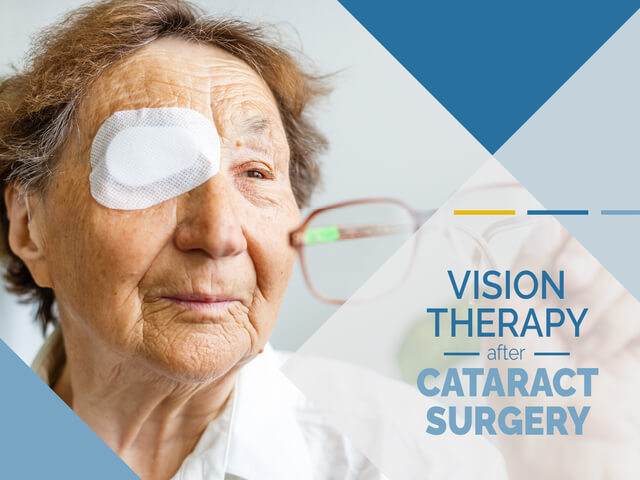
Cataract surgery is a standard and successful procedure that can improve your vision by restoring clarity. Studies show that patients can regain up to 90% of their vision, making it an excellent option for people with cataracts. However, it's essential to understand that not all cataract surgeries produce the same results.
Sometimes, the eyes may not readily adapt to the intraocular lens (IOL) implanted during the procedure. Vision therapy offers a tailored approach to optimize your visual recovery.
Understanding Cataract Surgery: How it Works
Cataracts, which often occur as we age, make our vision cloudy, causing problems like blurry vision, sensitivity to light, and difficulty seeing in different lighting situations. The solution to this prevalent problem is cataract surgery, a remarkably effective procedure.
Local anesthesia numbs the eye during this surgical process, ensuring the patient's comfort. An incredibly tiny incision accesses the cloudy lens, which is then meticulously fragmented and removed from the eye. Subsequently, the surgical team skillfully implants an artificial intraocular lens (IOL) to meet the patient's specific visual needs, whether for distance or near vision correction. The incision, designed to be self-sealing or requiring minimal sutures, is carefully closed. In most cases, patients can anticipate significant improvements in their vision shortly after undergoing cataract surgery.
Vision Therapy for Post-Cataract Surgery
While cataract surgery is renowned for its effectiveness, it's crucial to recognize that not all procedures yield identical results. Some eyes may not readily adapt to the implanted intraocular lens (IOL). Vision therapy emerges as an invaluable solution.
Vision therapy, a structured program of exercises and activities, is tailored to retrain the eyes and the brain to work harmoniously, enhancing visual functioning. This approach addresses specific aspects of vision recovery following cataract surgery, including eye teaming, focusing, tracking, and visual processing challenges.
Patients who embark on this post-surgery vision therapy journey reap many benefits. Some report reduced eye strain and fatigue, enhanced attention and concentration, and improved memory and visual processing capabilities.
Reports indicate that patients find it easier to balance close-up and distance vision after undergoing vision therapy. Ultimately, vision therapy plays a pivotal role in maximizing the outcome of cataract surgery, ensuring that patients regain their vision and quality of life.
Post-Cataract Surgery Visual Challenges
While cataract surgery is generally highly successful, some patients may encounter specific visual challenges during recovery. These challenges can include:
Visual Distortions
Some individuals may experience mild distortions in their vision, such as halos, glare around lights, or difficulty focusing on objects.
Adaptation Period
Adjusting to new intraocular lenses (IOLs) and differences in visual perception may require time. Vision therapy is the recommended treatment for this adjustment.
Depth Perception Issues
Certain people may struggle with depth perception, impacting tasks that require precise distance judgment.
Vision Therapy for Enhanced Recovery
Vision therapy is an invaluable tool for post-cataract surgery rehabilitation. The Center for Vision Development offers a specialized program to address these specific visual challenges and enhance overall visual quality. Here's how vision therapy can benefit you:
Visual Rehabilitation
Vision therapy provides targeted exercises to retrain the eyes and brain, helping you adapt to the changes in your vision following cataract surgery. It can significantly improve visual clarity and reduce distortions, ultimately enhancing your overall visual experience.
Depth Perception Enhancement
Vision therapy can be transformative for those grappling with depth perception issues post-surgery. It helps improve your ability to accurately judge distances, a crucial skill for driving and safely navigating your surroundings.
Personalized Approach
Every individual's visual challenges are unique, and that's where the strength of vision therapy shines. Vision therapists tailor programs to your needs, ensuring you receive the most effective and efficient rehabilitation possible.
Working with a Vision Therapist
Working with a qualified vision therapist is crucial to harness the benefits of vision therapy after cataract surgery. Schedule an appointment with The Center for Vision Development to thoroughly assess your specific visual challenges. Your vision therapist stands by to create a personalized program to help you get the most from your cataract surgery.
Restore Your Vision with The Center for Vision Development
Cataract surgery offers an exceptional opportunity to regain clear vision. However, the individual experience can vary, and some patients may face unique visual challenges post-surgery. If you're considering vision therapy after cataract surgery, call The Center for Vision Development to speak with a therapist and improve your vision and quality of life.
